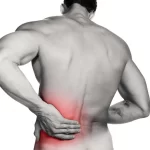Back pain is a common condition that affects people of all ages and can be caused by a variety of factors, including poor posture, heavy lifting, or underlying medical conditions. It is estimated that up to 80% of adults will experience back pain at some point in their lives. Many cases of back pain can be treated with rest, exercise, and over-the-counter pain relievers, but some cases require medical attention. Delaying treatment can lead to further complications and long-term damage, so it’s important to know when to see a doctor for back pain. This blog post discusses when to see a specialist. Describes the warning signs that indicate the need for medical attention, including whether it is necessary. By heeding these warning signs, you can take proactive steps to manage your back pain and prevent it from becoming a chronic condition.
Warning signs that you need immediate medical attention:
Although most cases of back pain can be managed with self-medication or over-the-counter pain relievers, there are certain indications that require immediate medical attention. These symptoms may indicate a serious underlying medical condition that requires urgent treatment. Here are five warning signs that you shouldn’t ignore.
1. Loss of bowel or bladder control – If you notice a loss of bowel or bladder control, it may indicate a serious condition like cauda equina syndrome. Although rare, this is a serious condition that affects the nerves below the spinal cord and requires immediate medical attention. B. Numbness or weakness in the legs – Sudden numbness or weakness in one or both legs may be a sign of a herniated disc or spinal cord compression. These conditions require immediate medical attention to avoid permanent nerve damage.
2. Severe pain that gets worse with movement – Severe back pain that gets worse with movement may indicate a fracture, infection, or tumor. These conditions require immediate medical attention to prevent further damage.
3. Fever or chills with back pain – If you have a fever or chills with pain in your back, this may indicate infection or inflammation. These conditions require immediate medical attention to prevent further complications.
4. Picture Recent Trauma or Back Injury – If you recently had a trauma or back injury and are in severe pain, this may indicate a fracture or spinal cord injury. Seek medical attention immediately to prevent further damage.
Seek immediate medical attention if you notice any of these warning signs. Ignoring these symptoms can lead to permanent nerve damage and other serious complications. Remember, early intervention is the key to preventing further damage and increasing your chances of recovery.
Warning Signs to See a Doctor
In addition to the warning signs that you should seek immediate medical attention, there are other symptoms that require immediate medical attention and Back pain treatment. These symptoms may indicate an underlying condition that requires medical intervention. Here are five warning signs that should prompt you to see a doctor.
1. Pain that lasts longer than 4-6 weeks – Back pain that lasts longer than 4-6 weeks despite self-treatment may be a sign of an underlying medical condition such as: B. Disc herniation, arthritis or spinal stenosis. Your doctor can help diagnose the cause of your pain and suggest appropriate treatments.
2. Unexplained weight loss with back pain – If you experience unexplained weight loss with back pain, it can be a sign of a serious condition like cancer. Your doctor can help identify the cause of your symptoms and suggest appropriate treatments.
3. Pain that interferes with sleep – If your back pain wakes you up during the night or wakes you up frequently, it may be a sign of an underlying medical condition that needs to be treated. Your doctor will identify the cause of your pain and suggest appropriate treatments to help you sleep better.
4. Difficulty standing or walking – Back pain that makes it difficult for you to stand or walk can be a sign of a herniated disc, spinal stenosis, or another serious condition. Your doctor can diagnose the cause of your pain and suggest appropriate treatments to improve your mobility. E. History of Cancer or Osteoporosis – If you have a history of cancer or osteoporosis, you may be at an increased risk of back pain and related complications. Your doctor can monitor your symptoms and recommend appropriate treatment to prevent further damage.
If any of these warning signs occur, it’s important to see your doctor for further evaluation. Early intervention can prevent further damage and increase the chances of recovery.
When to See a Specialist
In some cases, your GP may refer you to a specialist for further evaluation and treatment of your back pain. He has four situations when he needs to see a specialist.
Disabling chronic pain – If you have chronic, disabling low back pain despite self-help and medical treatment, a professional can provide additional treatment options and therapies to help you manage your pain. You may be able to.
Previous Spinal Surgery – If you have had previous spinal surgery and have new or worsening back pain, a specialist can help identify the cause of your pain and recommend appropriate treatment options. .
Complicated Spine Conditions – If you have complex spinal conditions such as scoliosis or spinal cord compression, professionals with expertise in these conditions can provide specialized care and treatment options.
Conclusion
Back pain can be a difficult condition, but it’s important to know when to see a doctor and when to see a specialist. By recognizing the signs that you need immediate medical attention and the ones that require immediate medical attention, you can take proactive steps to reduce pain and prevent further complications.
If you notice any of the symptoms described in this post, don’t hesitate to see your doctor. Early intervention is key to preventing further damage and increasing the chances of recovery. Always remember to consult your primary care physician and follow their recommendations for further evaluation and treatment.
If you are experiencing back pain, it can be difficult to find the right doctor who can accurately diagnose the cause of your pain and recommend appropriate treatment options. Dr. Tonde’s Neuro & Ortho clinic is a great option for individuals seeking Back Pain Treatment in Aundh. Dr. Priyanka Walzade Tonde is a highly experienced neurosurgeon and spine specialist with over 10 years of experience. His clinic offers a wide range of services, including consultation, diagnosis, and treatment for various spine conditions such as herniated discs, spinal stenosis, and scoliosis. In addition to his expertise in spine conditions, Dr. Tonde also specializes in treating various neurological conditions such as brain tumors, stroke, and epilepsy.




